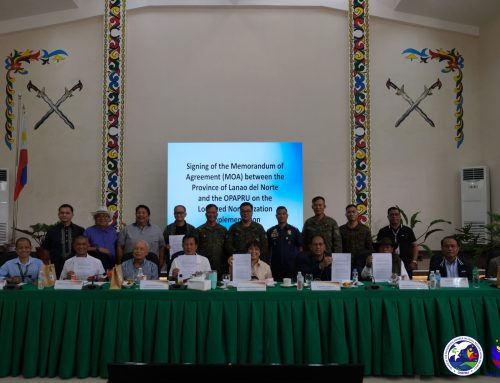CAMP AQUINO, TARLAC CITY — In a bid to push forward the Marcos administration’s peace and security agenda in the region, top officials of the Office of the Presidential Adviser on Peace, Reconciliation and Unity (OPAPRU) met with the Armed Forces of the Philippines’ brigade commanders in Northern Luzon here on Thursday, February 15, this city.
The meeting aimed to update the military regarding developments in the implementation of the Localized Peace Engagement (LPE) effort and its Transformation Program (TP), as well as the proposed establishment of Peace and Development Center mechanisms in targeted provinces in the region.
The Transformation Program is designed to complement the LPE, which is among the 12 lines of effort under the National Task Force to End Local Armed Conflict (NTF-ELCAC) and is now considered as one of the most effective ways of dealing with the Communist Party of the Philippines-New People’s Army-National Democratic Front (CPP-NPA-NDF).
The cross-cutting program is anchored on Executive Order (EO) No. 70 series of 2018, which calls for the use of a whole-of-nation approach in addressing the challenges caused by the communist armed conflict. EO No. 70 also led to the creation of the NTF-ELCAC.
Shifting from security to peace and development
The revitalized LPE framework is intended to ensure the complete transformation of former rebels and their full integration into mainstream society. It also seeks to promote development and strengthen the resiliency of cleared communities against the recovery efforts of the communist group.
Lieutenant General Fernyl G. Buca, PAF, chief of the Northern Luzon Command, said that it is crucial for the AFP to be properly oriented on the national government’s latest peace and security interventions to ensure their effective implementation on the ground.
“It is very fitting to have this discussion now, especially that the NOLCOM is currently implementing efforts that are aimed at sustaining the government interventions for the former rebels. We are here to discuss the latest and different programs of OPAPRU and how we can collaborate to implement these programs effectively and efficiently,” Buca said.
In his remarks during the gathering, Presidential Peace Adviser Secretary Carlito G. Galvez, Jr. said it is essential to further intensify peace and development efforts in Northern Luzon, noting that the region is carrying out various peacebuilding initiatives such as skills training, the provision of livelihood grants to former rebels, and the establishment of a Peace and Development Center in Baguio City.
“We have been working closely with the security sector since last year in the roll out of the Transformation Program here in Northern Luzon,” Galvez said, as he noted that the program’s implementation is already gaining major headway.
According to the peace adviser, 26 provincial government units across the country have already crafted their respective implementation plans in line with the Transformation Program.
“This cross-cutting program utilizes a whole-of-nation approach wherein all sectors are actively involved in the process. It is also a platform for the convergence of community-driven peace and development initiatives such as local peace engagements, E-CLIP and Payapa at Masaganang Pamayanan or the PAMANA,” Galvez added.
AFP pledges continued support to PAMANA’s implementation
He also encouraged the Northern Luzon Command to aid the government in identifying socio-economic interventions that should be implemented in the region in order to sustain the gains of peace and help uplift lives of former rebels, their families and communities.
“We will work hard for the allotment of funds for the regions in Northern Luzon for socio-economic programs and this will be under the PAMANA program. We need the AFP’s support and commitment as we identify and implement these programs since you know exactly the concerns and needs on the ground,” Galvez said.
The OPAPRU is currently taking the lead in the implementation of the Payapa at Masaganang Pamayanan Program (PAMANA) which is a priority program of the national government that supports the peace negotiation track and contributes to the goal of attaining a just and lasting peace in the country.
In particular, PAMANA aims to contribute to addressing issues of injustices and improve community access to socio-economic interventions; improve governance by building the capacity of national government agencies and local government units for a conflict-sensitive, peace-promoting, culture-sensitive and gender-sensitive approach to human rights promotion and development; and empower communities and strengthen their capacities to address issues of conflict and peace. ###












